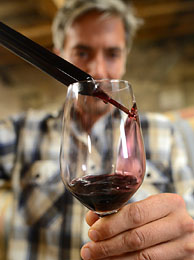 I started a fermentation with 10 lbs. of cleaned orange fruit, 6.5 lbs. of sugar, 3 gallons of water, yeast, pectic enzyme etc. I forgot to take the original specific gravity. If I remember correctly when I racked the first time my reading was 1.030. I just racked it a second time and am getting the reading of .990. Any way to accurately figure out the alcohol content or not? I’ll know better next time. Smells like its got a kick to it.
I started a fermentation with 10 lbs. of cleaned orange fruit, 6.5 lbs. of sugar, 3 gallons of water, yeast, pectic enzyme etc. I forgot to take the original specific gravity. If I remember correctly when I racked the first time my reading was 1.030. I just racked it a second time and am getting the reading of .990. Any way to accurately figure out the alcohol content or not? I’ll know better next time. Smells like its got a kick to it.
Name: Barney
State: Louisiana
The short answer to your question is, “Not unless your willing to spend some bucks on lab equipment”.
As a home winemaker, determining the alcohol level of a finished wine without a beginning wine hydrometer reading is difficult. Knowing the beginning reading along with an ending reading make it just a simple matter of easy math to figure out, but when you don’t have the beginning reading, determining the alcohol level quickly turns into a science project.
Without the beginning reading the wine hydrometer is no longer of any value to you for this purpose. It’s good to know that your wine is at 0.990 on the Specific Gravity scale, indicating that the fermentation did complete, but beyond this it is of no help. You’ll need to rely on some other piece of equipment.
Your first option is to use a Vinometer. The big plus to using this apparatus is that it is not too terribly expensive. The big minus is that it is not too terribly accurate, either. And, if your wine has any significant residual sugar in it, — which yours does not, with a reading of 0.990 — the measurement will not be accurate at all. In fact, it will be in another ballpark.
The Vinometer is fairly simple to use. I works off the surface tension of the liquid, in this case the wine. You start by filling up a thin channel in a glass pipe or pipette. Then turn the pipette upside-down to allow the wine to run out. You determine how much alcohol is in the wine by observing how much wine stays in the Vinometer verses how much falls out. There is a scale along its side to help you do this.
Your second option is to use an Ebullioscope. This apparatus is much more expensive but much more accurate. It is basically a lab-quality mini still. You take a measured sample of the wine and bring it to the boiling point of alcohol, which is lower than water, and essentially steam all the alcohol out of the wine. The steam is collected in a closed environment, then cooled and measured in relation to the wine sample size. As you can start to see, unless you’re a small winery, this is probably not to practical.
While the Ebullioscope is very accurate, it is not completely accurate. Other trace amounts of volatile elements do rise with the alcohol steam, otherwise known as “essence”, so there is even a third way to measure the alcohol level, one that is ultimately accurate, and it’s the way the big boys do it. That is to use chromatography.
What it means for the home winemaker, or even the small winery, is send it to the lab with a large check, and they’ll tell you what the alcohol level of your wine is with great accuracy. What it means for the large winery is they’ll send the sample to their in-house lab and run it through a piece of equipment that costs thousands of dollars.
Another blog post that you may want to take a look at that is related to this subject is “Controlling Alcohol With A Gravity Hydrometer“. It goes into a little more detail about actually using the hydrometer to determine the alcohol level of your wine.
I guess the moral to this blog post would be to, “Never forget to take your beginning wine hydrometer reading!” It is vital to determining the alcohol level of your homemade wine. Without it your pretty much out of luck.
Best Wishes,
Ed Kraus
———————————————————————————————————
Ed Kraus is a 3rd generation home brewer/winemaker and has been an owner of E. C. Kraus since 1999. He has been helping individuals make better wine and beer for over 25 years.

Really, does it matter what the alc. content is? As long as it tastes good, looks good and has a good aroma, it really doesn’t matter the alc level. You can’t change it anyway. Drink it and enjoy!!
1 lb sugar raises the SG in 3 gallons of water 1.5 – 1.7 SG’s. 6.5 x 1.7 = 11% approximately. Even after I add 7-8 lbs sugar and 10 lbs of fruit to 3 gallons of water, I still end up with 11-12% SG nearly always, so 11% would be a good guesstimate. 🙂